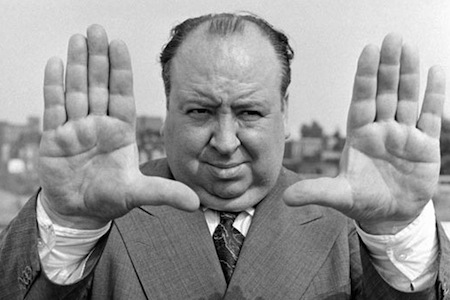Paying Tribute to the Master of Suspense
Radiotheatre: The Alfred Hitchcock Festival
Under St. Marks Theater
94 St. Marks Place
New York, N.Y.

The Under St. Marks Theater is really under St. Marks, laying beyond a narrow door, down a dozen or more old stone steps through a dark tunnel -- a very small, very dark, and very foreboding theater. It is, in short, a perfect place for the new Alfred Hitchcock Theater Festival, which features radio plays based on Hitchcock film classics such as Rebecca, Strangers on a Train, Suspicion and 39 Steps.
The theater festival, which just opened, joins two new movies about the British director in yet another wave of fanaticism for his mystery and suspense stories. The producers of the festival were not able to present stage versions of all of his films (how do you get Mount Rushmore, a pivotal plot point in North by Northwest, into an underground theater?) but they picked some fine ones. The British director made sixty movies in his sixty-year career, hosted the long-running television show "Alfred Hitchcock Presents" and also lent his name to the Alfred Hitchcock's Mystery Magazine. He was a cinematic giant.
Today’s radio theater is a faithful recreation of the old radio dramas of the 1940s. Several actors read the roles of a dozen or so characters and get in whatever characterizations and drama they can. Some sounds and background music is added. There are no sets, special effect or real music. Everything is left to the imaginations of those in the audience. When done well, they are very entertaining.
That was the case with Rebecca and The Lodger, a double bill of thirty minute plays that I caught last week. These plays are not new. Back in the 1940s, radio producers routinely adopted movies to radio and used several Hitchcock films. Rebecca, a 1940 movie, went on radio in 1943 and The Lodger, filmed in 1927, went on the air in its shortened form in 1948.
Rebecca, of course, is the legendary story of the naïve girl who dreamed she went back to Manderley again. The 1940 film won the Oscar for best picture and made international stars out of Laurence Olivier and Joan Fontaine. This radio version of the play works well because of the soaring skills of Stephanie Heitman, who plays aristocratic widower Maxim de Winter’s new wife, who arrives at the sprawling English country estate Manderley to find everyone still in love with his late first wife, Rebecca. The story, as moviegoers know, has many twists and turns and a chilling conclusion. The cast, which also includes Joshua Nicholson and Thom Christensen, brings the play to life without the help of the silver screen under the spritely direction of Frank Zilinyl.
Historically, radio plays suffer. The movie screen enables the director to show history through clothing, cars and architecture, even if the characters do not. In radio, all that is lost. Except for some descriptions of places, there is little here.
There is a bit more history in The Lodger, one of many Jack the Ripper stories. Here, the lodger (the supposed Ripper) tells you what year it is and the spoken descriptions of him, and what he wears, the neighborhood and how people travel about the city, are more evocative of the late nineteenth century. Hitchcock’s movie, which opened in the silent era, was much closer to the Ripper’s year of terror, the 1880s, than other films and the radio play, written much later, still reflects that closer historical connection.
The plot of The Lodger is a bit thin, but the acting is superb. (It's always thrilling when American actors can convincing do English accents). An unknown and suspicious boarder takes a room in a London home...
Thom Christensen is excellent as the lodger. Others in the cast are Adam Segaller, Ilyana Kadushin, Josh Nicholson and Stephanie Heitman. Frank Zilinyl directed this production, too. The Lodger is particularly interesting because it tracks the career of the fabled London serial killer. The Ripper murdered several prostitutes in Whitechapel, a rundown neighborhood in London, in 1888. He was called the Ripper because he cut out internal organs from the women. The police were unable to solve the crimes and the city was terrified for years afterwards, certain he would strike again. Over the years, countless men have been named as the Ripper, but the case has never been solved. All of the novels, documentaries and feature films about him give viewers a nice look at an 1888 London and police work at that time.
I have seen a number of radio plays. They are all historic in nature because these scripts were usually written in the 1940s and recount stories written prior to that (King Kong is a good example). I wish there were more festivals like the one in New York. The radio plays give you a whole new look at history and stories.
The remaining plays in the festival are Strangers on a Train (April 13 and 20) and 39 Steps and Suspicion (April 27 and May 4). The festival runs through May 4.
PRODUCTION: Produced by the Horse Trade Theater Group, Radio Theater, Dan Bianchi. Sound: Eduardo Ramirez.
